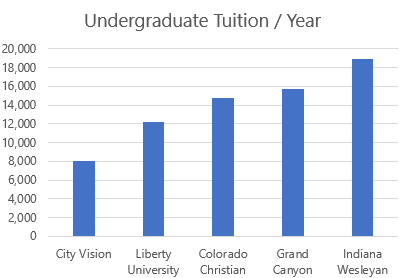City Vision is nationally accredited by the Distance Education Accrediting Commission (DEAC), which is recognized by the US Department of Education and CHEA. The US Department of Education does not recognize a distinction between regional and national accreditation in its standards and recently stated, “The Department does not believe…that rejecting transfer credits, an application for admission to graduate school, or a request to sit for a State occupational licensing exam on the basis of the type of Department recognized accreditation is justified.” See the US Department of Education letter on National vs. Regional Accreditation.
We have heard from a number of our students that other schools (sadly, even Christian schools) use scare tactics as a part of their sales practice, and misrepresent the significance of the distinction between national and regional accreditation.
From a Christian social justice perspective, many have called the distinction between regional and national accreditation a cartel that is a major injustice that hurts the poor. Having said that, there are those that still maintain this distinction, so we address their concerns in this section. This letter from Dr. Leah Matthews addresses some concerns about the quality of DEAC accreditation.
Functionally, our experience has been that the distinction between regional and national accreditation is primarily of importance for:
- Student pursuing academic careers, since many high-end schools may require Ph.D.’s from regionally accredited schools. A very small percentage of jobs (mostly academic) require regional accreditation. For example, a recent search of jobs in Boston showed 19 jobs out of 65,645 total requiring regional accreditation (of which 18 were in academic institutions).
- Students pursuing licensing in fields that often require a master’s degree from a regionally accredited school, such as Counseling or Social Work. It is because of this reason that City Vision does not offer master’s programs in these fields. As listed above, regional master’s programs to date have always accepted our bachelor’s degrees, but the decision is up to each individual school.
- Students planning to complete their bachelor’s degree at other schools. Many state schools and some CCCU schools may not accept transfer credits from nationally accredited schools. It is up to each school on what transfer credits they accept. Based on this, for students that come to City Vision that do not plan to complete either their associate’s or bachelor’s with us, but expect to complete at a state university or CCCU school, we recommend that they first check with that school on credit transferability.
Ultimately, choosing City Vision’s national accreditation over a regionally accredited school is a question of value: you get more for your money with City Vision. If you need the “gold plating” of regional accreditation for one of the reasons described above, then it may be worth paying 2-10 times more to get a degree with regional accreditation from another school. However, because of the career choices of our students, they prefer to choose the value of City Vision rather than more expensive high-end options.










